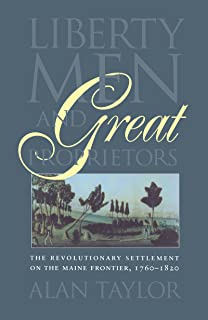 Recording of Alan Taylor’s presentation of Liberty Men and Great Proprietors: The Revolutionary Settlement on the Maine Frontier, 1760-1820 on December 16, 2020. In the years leading up to Maine Statehood, the political culture in the District of Maine was fraught with conflict, resentment, political theater, and the pursuit of opportunity. Join noted American historian and Pulitzer prize winner Alan Taylor to learn about settlers trying to build lives on the Maine frontier, wealthy landowners seeking to monetize vast tracts of land they had been granted, and for conversation about how the story of “liberty men” and “great proprietors” might help us understand Maine today.
Recording of Alan Taylor’s presentation of Liberty Men and Great Proprietors: The Revolutionary Settlement on the Maine Frontier, 1760-1820 on December 16, 2020. In the years leading up to Maine Statehood, the political culture in the District of Maine was fraught with conflict, resentment, political theater, and the pursuit of opportunity. Join noted American historian and Pulitzer prize winner Alan Taylor to learn about settlers trying to build lives on the Maine frontier, wealthy landowners seeking to monetize vast tracts of land they had been granted, and for conversation about how the story of “liberty men” and “great proprietors” might help us understand Maine today.
.
For a local rendition of what occured in Liberty, taken from A Brief History of the Town of Liberty: Celebration of Centennial Anniversary, August 25, 1927, pages 31-32.
LAND TROUBLES
As Told by a Grandson of Benjamin Tibbetts.
As early as 1809-10 Benjamin Tibbets came up the Sheepscot River in a canoe to hunt and trap. He was so impressed with the country that after the War of 1812 in which he served, he decided to come to what is now Liberty and establish a home. With him came John E. Dodge, William Lewis, Ebenezer Colby, a man by the name of Boyd and perhaps several others. They had understood that the government was to give the soldiers and sailors grants of land for their services. The grants were later given, but in the west in what is now Ohio. Many from Palermo and Montville and Boyd, who had built a log cabin on the hill in what is now Grover Cox pasture, went west to take up claims but Tibbetts and many others sold out their claims and remained here.
So many were coming in to settle at this time (1816) that the Proprietors and Twenty Associates* sent an agent here to give titles to the land and collect pay. John Edwards had already obtained title to his land at the understood price of $1.50 per acre when the agent came insisting the price was to be $2.50 per acre. The settlers, in order to maintain their rights, held a secret meeting in William Lampson’s house where they decided to take the agent’s papers away from him and give him a good scare. The swore themselves to eternal secreacy, signing the pact by writing their names with their own blood.
After sending one of their number on a day ahead to spy out the agent’s exact whereabouts, they went one dark winter night to Hazen Ayer’s in Montville. Benjamin Tibbets was chosen to knock at the door and keep Mr. Ayer out of the way while the rest, dressed as Indians, captured the agent. All went as planned and they took him to St. George’s lake and threatened to drop him in a hole they had cut in the ice if he made any resistance. They then took his saddle bags containing his papers and let him go, returning to Lamson’s they burned the papers. The “Indians” were Joel Clark, William Lamson, John E. Dodge, Andre Glidden, and many others, some living in Palermo and Montville. The agent returned to Wiscasset or Camden and officers were sent here to get the offenders. They came in the night and started to take John Edwards, who by the way wasn’t in the party, but were scared off by his dog. After being forcibly ejected by Andres Glidden they succeeded in getting Joel Clark. They took him to Wiscasset where he was given a trial. When under oath he couldn’t lie and told the whole story. They put him into Charlestown, Mass., prison, but the governor soon pardoned him out. All the others fearing a like fate went to sea until matters should be straightened out, although they never bore Clark any ill will for his testimony. When the Proprietor heard of all these events they told the settlers to go to Camden and they should receive clear titles of their lands at the agreed price. In this way titles to many acres of land in the western part of Liberty were obtained.
* The early history of Liberty begins with an account of the Muscongus, or Waldo Patent. This grant was issued by the Plymouth Council, 1630, to John Beauchamp of London and Thomas Leverett of now Knox and Waldo Counties. In 1719 Pres. John Leverett of Harvard College, a great grandson of the original grantee entered upon measures of resettling and re-organizing the patent. He parceled the land into ten shares in common, and conveyed them to certain persons thenceforth called the “Ten Proprietors.” The Proprietors admitted twenty other partners termed the “Twenty Associates,” among whom were Cornelius and John Waldo of Boston.
Samuel Waldo deeded to the twenty associates a 100,000 acre tract of land which now includes the greater part of Camden, Hope, Appleton and Liberty, also several islands on the coast.
